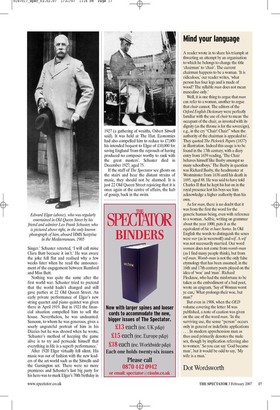Mind your language
A reader wrote in to share his triumph at thwarting an attempt by an organisation to which he belongs to change the title 'chairman' to 'chair'. The current chairman happens to be a woman. 'It is ridiculous,' our reader writes, 'what person has four legs and is made of wood? The syllable man does not mean masculine only.'
Well, it is one thing to argue that man can refer to a woman, another to argue that chair cannot. The editors of the Oxford English Dictionary were perfectly familiar with the use of chair to mean `the occupant of the chair, as invested with its dignity (as the throne is for the sovereign), e.g., in the cry "Chair! Chair!" when the authority of the chairman is appealed to'. They quoted The Pickwick Papers (1837) in illustration. Indeed this usage is to be found in the 17th century, with a diary entry from 1659 reading, 'The Chair behaves himself like Busby amongst so many schoolboys.' The Busby in question was Richard Busby, the headmaster at Westminster from 1638 until his death in 1695, aged 88. He was said to have told Charles II that he kept his hat on in the royal presence lest his boys see him acknowledge a higher authority than his own.
As for man, there is no doubt that it was from the first the word for the generic human being, even with reference to a woman. Aelfric, writing on grammar about the year 1000, puts it as the equivalent of hic et haec homo. In Old English the words to distinguish the sexes were wer (as in werewolf) and wif. A wif was not necessarily married. Our word woman does not come from womb-man (as I find many people think), but from wif-man. Womb-man is not the only false etymology that has been assumed; in the 16th and 17th century poets played on the idea of 'woe' and 'man'. Richard Flecknoe, who had the misfortune to be taken as the embodiment of a bad poet, wrote an epigram, 'Say of Woman worst ye can,/ What prolongs their woe, but man?'
But even in 1908, when the OED volume covering the letter M was published, a note of caution was given on the use of the word man. 'In the surviving use, the sense "person" occurs only in general or indefinite applications . . . In modern apprehension man as thus used primarily denotes the male sex, though by implication referring also to women.' So you can say 'God became man', but it would be odd to say, 'My wife is a man.'




















































 Previous page
Previous page